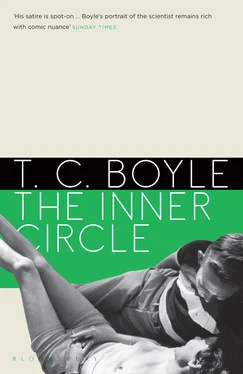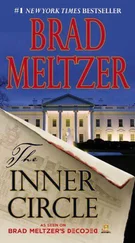I looked off down the deserted street, then came back to him. “No,” I said. “Not really.”
Prok’s house was an easy walk from campus, but in those days it was considered somewhat off the beaten path, as First Street and the neighborhood around it hadn’t yet been developed to the extent it now is. I had the impression of the odd sprawling house bracketed by tall black spikes of forest, and somewhere in the near distance there was the sound of a brook. Though there were no streetlights this far out, the glow of the stars and a three-quarters moon was enough to guide me past the occasional dark hump of an automobile drawn up alongside the curb, and each of the houses I passed seemed to have a lamp burning in every window. I was running a bit late because I’d spent the better part of an hour deciding on what to bring the hostess — an arrangement of dried flowers and pinecones that seemed to have been sprayed with white concrete in which were set some sort of piebald bird feathers, a bottle of bonded Kentucky bourbon, or a cheese that caught my eye in the grocery window. I’d settled on the cheese finally — the dried flowers were too risky, since I didn’t know a thing about botany and I’d be entering the domain of experts, and I passed over the bourbon because I didn’t know how Prok felt about the consumption of alcoholic beverages, though I suspected he was opposed to it both as a waste of time and inimical to one’s health.
When I did get there, at quarter past six and out of breath, I had to stop and recheck the address. I’d always been shy of social gatherings, afraid that I was in the wrong place or that I’d got the date confused or that the hosts wouldn’t recognize me or had forgotten they’d invited me to begin with. It was foolish, I know, but I’d even felt that way with my childhood friends in Michigan City, standing on a playmate’s doorstep with a catcher’s mitt or a basketball as I’d done a thousand times before and suddenly filled with the conviction that they’d turn me away, say something sharp and wounding, run me off like a stray dog. It didn’t help matters that I was out of my depth with this middle-aged professor and his wife (whoever she might turn out to be, I was terrified of her and what she might think of me, and in a state approaching panic over the thought of the other guests, who, for all I knew, might range from the town mayor to my literature professor and the president of the university). What would I say to them? What would I do?
So why then had I accepted the invitation in the first place? I can’t say, really. It was like that moment with Laura Feeney in the hall outside registration, a moment that seems to present itself as offering up a choice but is in actuality a confluence of circumstances that pins you to a course of action as decisively as Prok pins his Cynipids to the mounting board. Fate, I guess you would call it, though I wouldn’t want to give the impression that I’m making any sort of metaphysical or mystical connection here — I haven’t got a mystical bone in my body, not after spending the last sixteen years with Prok. I made my choice. I said yes, as I was to say yes to so many other invitations Prok would offer me, whether I wanted to or not. Again, looking back on it, I could see that Prok was a father figure to a young man whose own father was long dead and gone, and that he was powerful and persuasive — no one ever said no to Prok — but it went beyond that too. I was flattered by him. He’d chosen me — he was impressed by me — and I broke my first date with Iris to be there on that Saturday night in February.
But I had to recheck the address because the house was so — what better word for it? — unusual. From the street, in the grip of the night, it looked like a gingerbread house, something out of a fairy tale, the haunt of the necromancer or the sprite. The brick path wound circuitously through clumps of vegetation (Prok’s horticultural credo: “The orthogonal line is the recourse of the city planner, the curvilinear the gardener’s delight”), and though you could see that there was an order to it and that it did indeed lead to the front door, the effect was deceptively natural. As for the house, it glowed with windows and featured a stepped, shingled roof and walls constructed of odd-shaped bricks (seconds Prok had bought for a song) with great dabs of mortar leaking over them like icing on a sagging cake. This was the house of a scientist? I couldn’t believe it. I was certain I’d got the address wrong — misheard it, transposed the numbers — but by this time I was standing on the doorstep, and I was late, so there was nothing else to do but tuck the cheese under my arm (it was a Stilton and it must have weighed ten pounds), steel myself and lift the brass knocker.
A woman answered the door — or rather a female, as Prok would have it. She was tiny, childlike, with hair even blacker than Iris’s and cut short in a bob that left her ears exposed. She had a beautiful smile, natural and unaffected, and she was training it on me even as she pulled the door back with a slim white hand.
“I was — I’ve come — Does Professor Kinsey live here? By any chance?”
“I’m Clara,” she said, already accepting the cheese. “And you must be John. But here, come on in, Prok’s just finishing up some things and he’ll be with us in a moment.”
She led me inside, into the living room, which was as unconventional as the exterior of the house. The walls were painted black (or, as I was later to learn, stained with tea, which Prok felt would preserve them more effectively than paint) and the furniture, rustic and homemade, was of bent hickory, similarly painted black. There was a stand-up piano against one wall (also black), several bookcases full of records, and a gramophone. Lamps were placed about the room, softening the corners, and a fire burned in the open hearth. There was no sign of other guests.
“Mrs. Kinsey, I have to tell you I’m so sorry to have been, well, late — I’m not normally — but, I, uh, had some trouble finding the place, and I, uh—”
“Nonsense,” she said. “We don’t stand on ceremony here, John — we’ll eat when we’re hungry, so don’t you worry yourself. And please, call me Clara. Or better yet, Mac.” Her voice was breathy and hesitant, each syllable pulling back from the next with a gentle adhesion, as if words were like candy, like taffy, lingering reluctantly on her lips. She was forty-one years old, the mother of three, and no beauty, but she was fascinating, utterly, and from that moment forward she had me in her thrall.
We were standing in the middle of the room on what appeared to be a homemade rug. I must have been studying it unconsciously because Mac (her nickname, an abbreviation of her maiden name, McMillen, just as Prok was the short version of Professor K.) remarked, “Lovely, isn’t it? My husband’s handiwork.”
I said something inane in reply, along the lines that he was a very talented man.
Mac let out a little laugh. I wondered where the children were, where the other guests were, and at the same time secretly prayed there would be none. “But listen to me — I haven’t asked if you would like something to drink?”
I would. I wanted a bourbon, a good stiff one, to bring back the feeling in my fingers and toes and unfasten my tongue from the roof of my mouth. “Oh,” I said, “I don’t know. Anything. Water maybe?”
At that moment, as if on cue (but that’s a cliché: he was there all along, observing from the hallway, I’m sure of it), Prok appeared with an enameled tray in his hand, and on it a selection of liqueurs and three miniature long-stemmed glasses.
“Milk,” he cried, “glad you could make it, and welcome, welcome.” He set the tray down on a low black table in front of the hearth and motioned for me to take a seat. “I see you’ve already met Mac, and what’s this — a cheese? — ah, splendid. Perhaps Mac would do the honors, and some crackers, please, dear, crackers would be nice. And now,” turning back to me, “you’ll have a glass of spirits?”
Читать дальше












